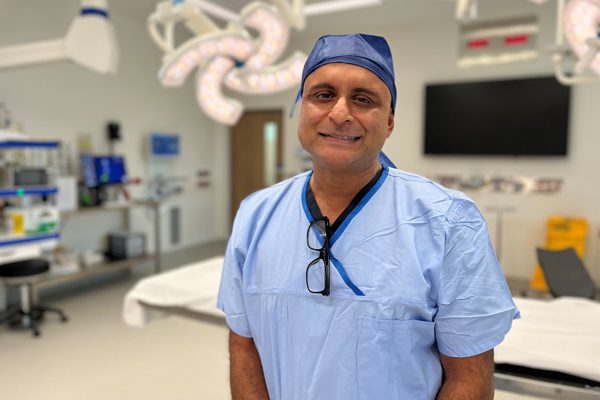Caboolture Hospital offers new surgical technique closer to home

Surgical Director Dr Dinesh Ratnapala is growing the breadth of work and surgical offering available at Caboolture Hospital.
Moreton Bay residents can now access treatment for painful pilonidal cysts closer to home.
Caboolture Hospital has recently expanded its surgical offering to include Endoscopic Pilonidal Sinus Treatment (EPSiT).
Caboolture Hospital Surgical Director Dr Dinesh Ratnapala said providing specialist surgical care locally is essential for the community and provides benefits for local doctors and their patients.
“As our local population grows, we recognise the need to provide responsive services. This includes developing ways to deliver quality care for patients closer to home, whether that is through providing treatment and rehabilitation at home or in the local community, or improving patient access to specialist surgical treatments,” said Dr Ratnapala.
“As an example, we are now pleased to offer a new surgical endoscopy technique called Endoscopic Pilonidal Sinus Treatment (EPSiT) for the treatment of a painful condition called pilonidal cysts.
“The service is easy to access and provides doctors (and their patients) with a safe surgical option that is less invasive and provides quicker recovery times.”
Pilonidal cysts occur when hair and debris become embedded in skin at the top of the buttocks, usually close to the tailbone. Over time, a significant amount of hair and debris can accumulate, causing a cavity to develop under the skin.
“A perfect storm of repeated skin irritation, a moist and warm environment, the collection of hair or debris and bacteria can lead to an infection. When this happens, a painful abscess can develop in the cavity and pus may start draining from the area,” said Dr Ratnapala.
EPSiT is a new, less invasive surgical treatment which uses a small camera to explore the area. Any embedded hairs are removed, and the internal lining of cyst is safely burnt (cauterised) and finally cleaned.
The procedure can be performed as a day-case procedure under a brief general, spinal anaesthetic or under local anaesthesia in selected patients. Due to little pain experienced and reduced time taken off work, patients who receive EPSiT frequently have a high satisfaction rate.
“In an ideal world, the best treatment for pilonidal cyst disease should be simple, painless, have high healing rates, low recurrence rates and involve minimal patient inconvenience. EPSiT in selected patients is very promising so far in the treatment of this disease,” said Dr Ratnapala.
“The wounds are quite small and don’t need insertion of packing material, patients have less pain after the procedure and can go back to daily life much faster.”
Dr Ratnapala said the surgical treatments offered at Caboolture Hospital are often on par with the larger tertiary hospitals and the surgeons have the expertise of performing significantly complex procedures as well as a wide range of emergency surgical work.
“As the local population has grown, so has the breadth of work and surgical offering. Caboolture Hospital has an excellent clinical framework to support its surgical services which includes excellent ICU and growing radiological capability, and a team of highly skilled clinicians,” he said.
“Having this skill set and expertise available in our local community allows patients to get the care they need, closer to where they live.”
This approach plays a key role in keeping people well, treating and managing acute illness and long-term conditions, and supporting people to live locally and independently in their own homes, with outcomes that are as good, if not better than similar sized hospitals and our tertiary centres.
